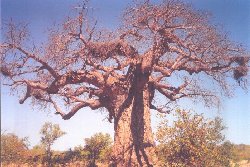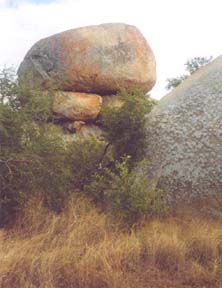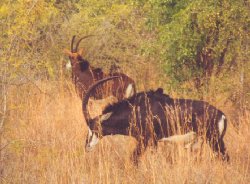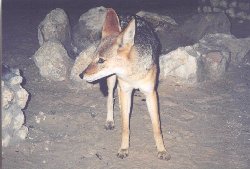Fourth
Africa Page
24 April 1998
Departed Sirheni Camp at sunrise for
the drive to Olifants. We chose all the tiniest roads we could find on the map and didn't
see another car for hours. Found a narrow track that led down to what looked like a good
overlook of the Olifants River. When we came to the end of the road there was a great herd
of Cape buffalo camped out under the mopane trees, chewing their cud. The ones closest to
us huffed and snorted and let us know we weren't welcome, so we were forced to back up all
the way to the main road.
 |
This baobab is at the southern reach of their
range. It is about 10 meters through the trunk and may be 2000 years old. Checked in at
Oliphants Camp and we were shown to our rondavel built on the edge of a cliff high above
the Oliphants River. The vistas
are spectacular; lots of game to be seen right from the veranda. |
| After dinner we went for a night game drive. Saw
Lions, Hyenas, Elephant, Giraffe, Kudu, Steenbok, Bushbuck, Spotted Genet, etc. etc. |
 |
25 April 1998
D and T up were up at dawn for a drive.
While traveling a track along the river they spotted a leopard finishing its breakfast on
the opposite bank. So we've now seen each of the 'Big Five' (Elephant, Cape Buffalo,
Rhino, Lion, Leopard).
 |
While we enjoyed lunch on the veranda Dan noticed a
Flap-necked Chameleon glued to the branch of a tree just a few feet away from us. It was
so well-camouflaged that we'd never have seen it but for the flicker of its impossibly
long tongue, each time it grabbed a buggy morsel. Later in the afternoon a parade of elephant moms and their babies crossed
the river far below. |
26 April 1998
| Next morning on our way from Oliphants to Skukuza
we passed these wonderfully sculpted boulders and read in our guidebook that these are the
oldest rocks (3.5 billion years) found anywhere on the earth's surface. |
 |
Skukuza is by far the biggest camp
inside Kruger, and seemed like a bustling town compared to where we'd been traveling for
the past few days.
 |
We provisioned at the store and
located the other five members who would be joining us on the Metsi Metsi bushwalk. Our
comrades were:
Meryl and Derek Russel from Capetown,
where Derek runs a trucking firm . . .
Jacques Marnewick, a software engineer
from Pretoria . . .
Anton and Luette Smoek, a recently wed
doctor/nurse couple from Gauteng. |
At 1530, Wouter Jordaan, the ranger who
would be guiding us for our three-day trek, met up with us. We loaded our gear aboard the
open-sided truck that would take us 45 kilometers to the basecamp from which we would make
our excursions into the bush. We were heading into a part of the Kruger wilderness miles
from the roads that are open to regular visitors.
For the next hour and a half we bumped
over a rutted dirt track, passing herds of Impala, Cape Buffalo, Kudu, Elephant, etc.,
etc. At last we topped a rise and looked down on the bushcamp. Then, just as we approached
the gate, seemingly out of nowhere a big male lion sauntered across our path. He glared at
us, and then continued on his way. One-by-one, six more lions rose up out of the foot-tall
grass alongside the road. They'd been only spitting distance away from us all along, but
their tawny hides blend into the dry grass so perfectly as to render them all but
invisible. As we drove through the gate, everybody looked askance at the puny, chest-tall
perimeter fence that served as the only barrier between where we'd be sleeping and these
totally wild predators.
(Woe is unto us. A roll of 36-exposure
film we took while at Metsi Metsi . . .of course, the roll with our best shots! . .
inexplicably disappeared before we could get it to a developer. We lost most of our best
animal pictures.)
| We unloaded our gear and then Wouter showed us
around the camp. It was rustic, yet considerably more plush than we'd ever been led to
hope for. There was no electricity, but a wood-fired boiler supplied hot water for the
shower, and the toilets actually flushed. There were four thatched A-frames scattered
around several acres of bush, each just large enough for two beds. Kaaren and Tyler chose
one, and Dan shared another with Jacques. |
 |
Jacques' company has been charged with
the seemingly impossible task of developing software for keeping track of registered
voters for the upcoming national elections . . .this in a country where a fair percentage
of the voters live in shantytowns with no address. He's one of the uppest, funniest people
we've ever met and K. found him delightfully charming.
27 - 29 April 1998 (by Kaaren)
. . . at 5am we were awakened by a
friendly "hello" and a bucket of warm water for a quick wash in our enamel
dishpans...this is part of the duties of our tracker, Fernando, who was to accompany us on
our walks. Fernando is a member of the local Sosutu tribe and has lived his whole life in
the bush. He talks very little, but we think he knows everything.
We hopped onto our truck and as the sun
came up we saw giraffes, wildebeest, and zebras. Afer twenty minutes of driving over a
barely discernable dirt track we began our walk into the bush. This is very strange to us,
because in Kruger you cannot get out of your vehicle at any time except at specific rest
stops where there are park personnel. Here we were on foot heading out into the
wilderness, with Wouter and Fernando in front, .458 Weatherby rifles slung over their
shoulders. Of course, there were some worried glances around the group at first - who
amongst us would bring up the rear??? We took turns...
| Animal trails provide the easiest paths and we
followed them throughout the morning. The animals hear and smell you much sooner than they
do when you are in a car, so you tend to see fewer of them. However, when you do see them
and you have no protection other than the guide's gun, it is an adrenaline rush. |
 |
On this first day of walking we came
upon the sole of a shoe lying in the sand. We were way out in the bush, where supposedly
no one had been for years...and nearby was the distinctive scat of a lion. Wouter
explained that sometimes refugees from Mozambique try to cross the park and some don't
make it. Occasionally lion droppings are found containing fingernails and hard to digest
parts of clothing. Poachers are also a problem, especially on the northern border. They
still use snares, which can kill and maim the animals - this may be what happened to the
elephant we saw yesterday with part of his trunk missing. This is part of the game
ranger's job...to keep poachers out of the park, as well as tracking down animals that
have been injured and have to be destroyed.
 |
After a long walk with many sightings of a variety
of animals, we headed back to camp by truck for lunch and a rest. We were proving to be a
most congenial group, and all our meals back at camp were delightful social experiences.
The Russells are inveterate Africa adventurers and Derek regaled us with stories of their
travels. |
At 3:30 pm, we again headed out for an
evening hike ...this is much more exciting. Nocturnal creatures start to come alive after
the hot afternoon. We crossed a lioness' spoor and tracked her along a narrow riverbed.
Eight-foot tall reeds rose on either side of the shoulder-width track and Wouter and
Fernando were tense, with guns in hand and at the ready. Ty was the first to spot the lion
lying under a bush a stone's throw away as we rounded a bend in the river. Usually you see
more than one lion at a time and we were nervous that we couldn't find any others. Her
muzzle was smeared with blood and it was obvious she'd just finished feeding. The fat
lioness spotted us and slunk off through the brush. We took a closer look where we'd first
spotted her and Wouter identified the remains of a young impala. She'd eaten most
everything of it, leaving only one hoof and 2 little horns!
We slept like logs after a cocktail
hour around the campfire and dinner by lanternlight. Up again at dawn, we trekked through
a part of the park Woulter had not been in for years...although it was good for birds, it
was very sparse in game. This was just fine, though, as we all enjoyed the solitude and
exercise.
On the evening walk of the last day
we hiked along a riverbed that ended in a perennial waterhole. As we reached the
lily-covered pond we heard the laughing grunts of hippopotami warning the group of
two-legged intruders to keep their distance! |
 |
It was just turning into the magic hour
- the golden tones of the setting sun highlighted the eyes, nose and waggling ears of
several huge hippos submerged in the primeval pond. What a sight - bulls, babies and moms
all staring at us, making hippo noises. Then, on the opposite side of the waterhole, an
elephant quietly appeared from the bush for a drink - just as two crocodiles decided to
settle a territorial dispute . . . scared the elephant out of his wits - he jumped back,
hesitated, then ambled off to find another place to satisfy his thirst. We crept up on one
croc that looked like a 12-foot long log. As soon as he sensed our presence he was off
into the water and kept an eye (actually, 2 eyes and a nose) on us for quite awhile. When
we crossed a narrow dam at the end of the pond, I kept MY eyes open for him!
We arrived back at the truck just as
night dropped like a black curtain, and we spotted all sorts of game as we drove back to
camp in the dark. Another night of conversation, South African wine and good vittles...and
sadness that it would all come to an end in the morning . . .
29 April 1998
 |
We packed up and left Metsi Metsi for the drive
back to Skukuza. Along the way we spotted these rare and beautiful Sable antelope. |
Heartfelt goodbyes to our fellow
bushtrekkers.
Now we head south to our next camp at
Lower Sabie. Stopped to watch lions feeding on a hippo kill right next to the road. The
way the trees and brush were broken and smashed all around the site, it had obviously been
a protracted and savage battle. It must have been a terrible spectacle and we were not
sorry to miss it. Hippo hide is very tough stuff and the lions were forced to work awfully
hard to get at the tender middle parts.
This is mean country to live and die
in, and no creature at any level of the food chain gets to avoid its share of suffering.
After a couple weeks of eating warthog, ostrich, springbok and oryx we realized we were
developing a certain callous acceptance of the eating-and-being-eaten. The two
less-reverent members of the family came up with this ditty:
'We like mustard
on our Bustard,
and catsup on our
Gnu . . .
Hyeener's make
good wieners,
but they're awful
tough to chew.
A fricassee of
Aardvark ,
is ever such a
treat . . .
It's a good that
thing that we're carnivores,
'cuz we love
eatin' meat!'
30 April 1998
| D. and T. revisited hippo kill. Fat, blood-smeared
lions lazing around. Mostly bones and hide left for the vultures . . . hyenas slink around
in the brush, waiting their chance to dash in and grab a bite of leftovers. |
 |
 |
Farther down the road we stopped at a pretty little
lake teeming with birdlife. Several new species including: Fisheagle, Saddlebill Stork,
Malachite Kingfisher. |
| We left Lower Sabie to Berg en Dahl,
where we'd stay for our last night inside Kruger. The nicest bungalow we've stayed
in yet. K. and D. shared sundowners next door with a very pleasant South African
couple, Deon and Henritte Kleynhans. When out in the bush, their sweet little daughter,
Natasha, takes her bath in the ice chest. |
| A Large Spotted Genet sat in a tree above the
veranda. This jackal hung
around all evening, probably hoping we'd leave a few tasty bits around the braai. Ty went
on his final night drive. |
 |
01 May 1998
 |
Left Berg en Dahl at dawn, taking backroads. Saw a
mom and baby rhino, Cape buffalo, African wild dogs. When we crossed the Crocodile River at Malalene Gate our adventures inside
Kruger National Park came to an end. |
A six-hour drive from Kruger to
Jo'berg. At 1900 we boarded a very full Olympic Airways plane for overnight flight to
Athens via Nairobi.
We're off to:
Greece
dktdavis@aol.com













